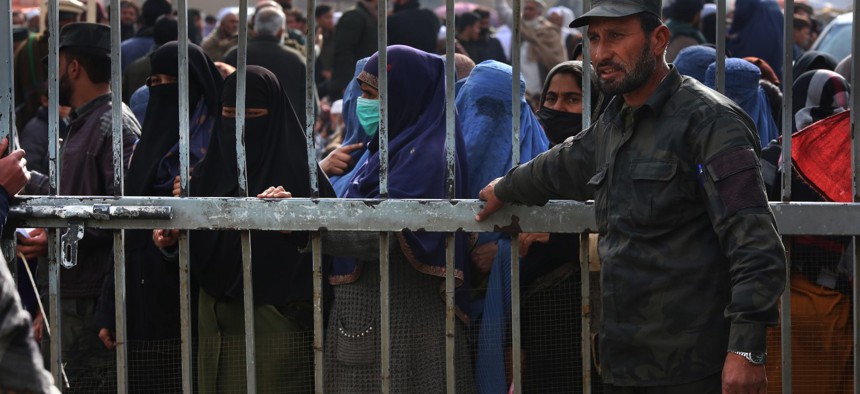
Afghans wait in lines for hours to receive food aid provided by international humanitarian organizations in Kabul, Afghanistan on December 7, 2021. Bilal Guler/Anadolu Agency via Getty Images
The Special IG for Afghanistan Shares Advice on How to Spend Aid Money Well
More recommendations will come in the watchdog’s quarterly report next week.
The Afghanistan watchdog on Thursday outlined a “path forward” for ensuring U.S. humanitarian aid, following the end of the 20-year war there, is well-spent.
John Sopko, who has been special inspector general for Afghanistan reconstruction since 2012, spoke at an Atlantic Council event on Thursday morning about lessons learned from the United States' involvement in Afghanistan and discussed the dire situation on the ground currently as documented by the United Nations. The special IG office was established in the 2008 National Defense Authorization Act to audit and investigate spending on reconstruction projects in the country. Its reports and warnings came into focus as the Taliban took over Afghanistan right as the United States was withdrawing its troops from the country before the 20th anniversary of the Sept. 11, 2001 terrorist attacks.
“We all know that Afghanistan faces a horrible humanitarian crisis,” Sopko said. “The United States continues to be the single largest donor providing $782 million in humanitarian aid for Afghanistan and Afghan refugees,” he said. Therefore, the United States, as well as other major donors, “must apply the lessons bitterly learned over the past 20 years lest urgent humanitarian aid for the Afghan people be wasted, stolen, or diverted by the Taliban.”
Sopko offered a “path forward” on reducing risk of fraud in the United States’ humanitarian relief based on the nearly 1,200 recommendations the special IG’s office has made over the past 13 years. His office has saved U.S. taxpayers over $4 billion in total, he said.
His best practices included: ensuring the aid has a clear purpose; requiring organizations receiving U.S. funding to be completely transparent on their use of funds; establishing a “tolerable level of risk” in programs and preparing to end such activities if the risk increases too much; devising clear metrics to measure outcomes, not just how much money was spent; making course corrections if activities are not going well; evaluating the accuracy of third-party monitoring reports on aid; realizing the situation on the ground in Afghanistan in constantly changing and “one size doesn't fit all;” looking for “smart opportunities” to condition aid; and seeking out activities that the Afghan people can eventually do mostly or complete on their own.
Additionally, “monitoring and evaluating is an essential activity to determine whether data are being collected, procedures followed, schedules met, waste avoided, and objectives attained,” said Sopko in his prepared remarks for the event. This is not a new concept because “[the Office of Management and Budget] requires U.S. agencies administering foreign assistance to use evidence-based evaluations based on verifiable data and information,” he said. “In Afghanistan, unfortunately, it was rarely followed.”
Sopko said he’s been “very encouraged” that the U.S. Agency for International Development has approached his office looking for advice about relief funding going forward. He noted next week his office will release its quarterly report that will expand on his remarks.
Since 2002, the United States has spent over $146 billion on reconstruction in Afghanistan and “our conservative estimate is that at least 30% of that aid was wasted or stolen,” said Sopko.
His office’s most recent quarterly report, published on October 30, says that about $110.26 billion of that approximate $146 billion was appropriated to six of the seven largest active reconstruction accounts and, as of September 30, 2021, “approximately $3.59 billion of the amount appropriated to these six reconstruction accounts remained for possible disbursement.” The report also details how the watchdog’s oversight efforts will continue.
“As long as there's money flowing, there's a need for oversight and SIGAR’s responsibility,” Sopko told Government Executive in early August before the Taliban completed its takeover of Afghanistan.
In a related matter, the top Republicans on the House Oversight and Reform Committee sent a letter to Rep. Carolyn Maloney, D-N.Y., committee chairwoman, calling for more oversight efforts into the United States’s “botched” withdrawal from Afghanistan, particularly public and in-person hearings with top Biden administration officials specifically focused on the country.
“Committee Democrats must step up, do their job, and hold the Biden administration accountable, even if it is politically inconvenient,” wrote Reps. James Comer, R-Ky, and Glenn Grothman, R-Wis., committee ranking member and ranking member for the subcommittee on National Security, respectively.
A spokesperson for the committee’s Democrats told Government Executive on background that Maloney and Rep. Stephen Lynch, D-Mass., chairman of the subpanel on National Security, “already held a public hearing that extensively covered the situation in Afghanistan just last month” during which “members on both sides of the aisle had the opportunity to question witnesses from the Department of Defense and the Department of State at both the public hearing and at a classified briefing that followed.”
While the scope of the hearing was expanded to include other countries with terrorist activity, questions about Afghanistan were “in bounds,” said Lynch at the top of the hearing.







